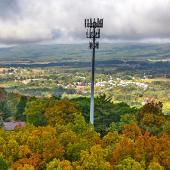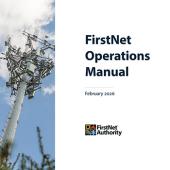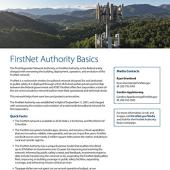This blog is a repost from StateTech Magazine, originally published on February 20, 2024.
Southeast of Denver on the Colorado plains, Elbert County is one of the fastest-growing counties in the state. Covering approximately 1,800 square miles, the county is roughly the size of the state of Delaware. Despite the vast area, the Elbert County Sheriff’s Office averages just two deputies and one supervisor per shift. It can take 45 to 60 minutes to drive across the county, complicating things if one of the two deputies needs backup during response.
Adding to this challenge is the county’s rural, remote landscape. Until recently, cellular and radio communications were unreliable in most areas. Deputies had to rely on landlines to call for assistance or wait until they were back in service areas to update command staff.
This lack of connectivity posed serious safety risks for the deputies and those they serve. Elbert County Sheriff Tim Norton made it a priority to address these communication challenges and bring his deputies better technology. After it was tested successfully in the county’s most remote areas, Norton switched his agency to FirstNet, the broadband network dedicated to public safety.
Elbert County Sheriff Ensures No Call Goes Unanswered
Sheriff Tim Norton is a law enforcement veteran with more than 30 years of service. He spent most of his career with a big city police department, so he understands how technology can benefit law enforcement.
“Our deputies rely on their phones and their computers in their cars, but when they got out to the far east or southeast part of the county, there was no communication whatsoever for them,” Norton says. “So, they were having to do everything they could before they went on scene, do what they had to do on scene, and then come back into a coverage area to work on their laptops or make calls or radio to dispatch.”
Today, the sheriff’s office uses FirstNet-enabled phones, the routers in their patrol cars are connected to FirstNet, and body camera footage is streamed over the network. This ensures that communication is possible, even in the furthest corners of the county. “Now, deputies can be anywhere in the county and get a connection,” Norton says. “With the low manpower we have, those officers have immediate contact with somebody whenever they need it.”
Real-Time Situational Awareness Supports Public Safety
Because deputies have to travel up to an hour to respond to a call, it is critical that they have access to real-time information to understand how an incident is changing. This situational awareness is vital to their response. Before FirstNet, deputies rarely had the ability to follow a situation as it unfolded, leaving them with outdated information as they approached a scene.
“With FirstNet, when I’m heading to a call, I have access to a lot more tools so that I can better prepare for when I’m on scene,” says Deputy Dustin Pastore. “I can see the dispatch notes as they’re coming in. I can talk to my partner as we’re preparing to respond to the scene.”
One busy night underscored the importance of Norton’s ability to communicate with his deputies and make strategic decisions. The county faced four simultaneous incidents requiring response: two driving under the influence incidents, a large bar fight and a domestic dispute involving a hatchet. With FirstNet, Sheriff Norton and his deputies were able to quickly gather details on each incident and make informed decisions for where the response was most needed. The result was a faster, safer response.
Interoperability and Innovation Are Critical as the County Grows
Growth in Elbert County isn’t expected to slow any time soon; within the next five years, an estimated 3,000 more homes will be built there. Sheriff Norton is already anticipating what this population surge will mean for city and county agencies and acknowledges interoperability is a key component to addressing the needs of the growing community.
Nearby agencies, such as the Elizabeth Fire Protection District, are already using FirstNet, allowing seamless communication between deputies and firefighters. Norton is also talking with support agencies such as the Public Works Department’s Road and Bridge team about the benefits of the network. He explains, “They’re out there in the middle of nowhere as well. When we have snow, we talk to their people often to assess road conditions and share important information. It’s been a game changer for us, and I believe it can enhance our communication and response with this critical team.”
Norton is also looking at opportunities to use more innovative technologies with the support of FirstNet. And as more agencies join the network, there are endless ways public safety in the county can work to better serve residents.
Reflecting with pride on the advances made so far in Elbert County, Norton says, “Wow! What a difference it’s made. It’s just all around a great asset for our department.”




















